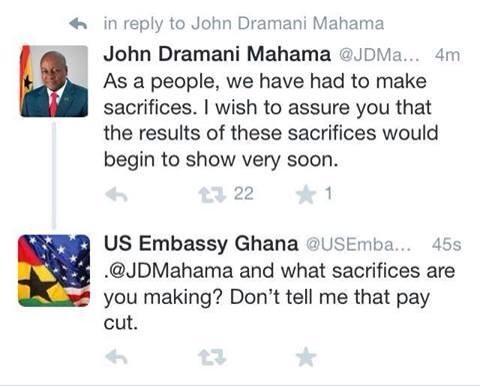US Embassy 'Mahama tweet': Separating fact from fiction
I've seen a lot of twisted analyses regarding a tweet by the US Embassy Ghana handle (@USEmbassyGhana) last week, which appeared to cast doubt on a claim by President John Mahama that he had made sacrifices in the interest of the nation.

Despite the embassy’s swift apology and explanation that the tweet was mistakenly sent out by a staff who thought he/she was logged into his/her own account, there has been massive, high-level disinformation on social media to the effect that the tweet represented the official position of the embassy and by extension, the United States government.
There has also been a determined, almost obsessive effort to commend the embassy for, as some have put it, speaking the truth about the true state of the nation. But nothing could be farther from the truth. It will be inaccurate, probably disingenuous to suggest that that tweet represents official US government position due to the following reasons:
1)Those who administer corporate Facebook pages or Twitter accounts know very well that that it’s very easy to mistakenly share your private opinions using those corporate accounts.
I have found myself in that awkward position on at least two occasions, and it would have been a disaster if I had not realised my mistakes early and made the necessary corrections.
My theory is that the administrator of the US Embassy Twitter handle was a young, enthusiastic Ghanaian, who, outraged by the President’s remark, mistakenly tweeted that reply using the embassy’s account. Indeed the embassy said: “The earlier errant tweet was a private message mistakenly sent out on our account. The views expressed in no way reflect the views of the USG or the U.S. Embassy…”
2) The US Embassy Ghana is not a stupid entity, and so will not speak anyhow to the President of a sovereign nation. (And, those who hold the unfortunate perception that a country loses its sovereignty when it receives foreign aid should note, for instance, that countries like Nigeria and Uganda have passed tough anti-homosexuality laws, despite resonant and relentless objection from their major economic partners, including the United States.)
3) If the US Embassy has something to tell the government, there are diplomatic channels that it will use to do so. And the embassy will have to do so in the softest possible tone, not recklessly via Twitter. No embassy on this earth will question the President of its host country in such an abrasive manner. And no serious country will tolerate such a conduct. This is a fact. (Our International Relations students can educate us better in this regard.)
4) The US government is not a coward. Assuming that the embassy indeed had the audacity to send out that tweet to Mahama, there is no reason why it would not have stood by it and defended its action.
I believe the embassy takes its integrity seriously. And if it will brazenly question Mahama’s integrity on Twitter, why will it cast doubt on its own integrity by capriciously turning around to deny the tweet and apologise? It’s clear that the embassy didn’t send the tweet.
Conclusion
The bottom line, in all these, is that people are very angry that the Ghanaian economy has been badly mismanaged. The economy is growing a slower rate than envisaged, with inflation in the double digits. We have a widening budget deficit and increased taxes and utility bills. The cedi also continues to slide against major international currencies.
Essentially, we are seeing what appears to be an overt and brazen dissipation of the country’s financial resources under the administration of John Mahama – a development that has, alongside the aforementioned, plunged ordinary Ghanaians into economic hellfire.
The government has an opportunity to urgently change course and reverse the economic declines we are seeing. Otherwise, nobody can predict how the citizenry will react. There is a saying that, if you press a spring too hard, it will recoil.
God bless our homeland, Ghana.
